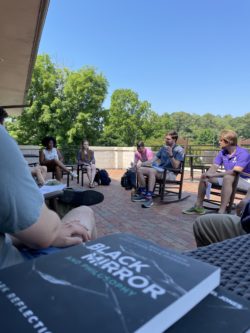MayX Snapshot: Through the looking glass with ‘Black Mirror’
Each day this week, we’re highlighting a course from May Experience – a chance for students to explore topics beyond the typical academic year.
COURSE: Technology and Dystopia of “Black Mirror”
INSTRUCTORS: Kevin Treu, professor and chair of computer science; Thomas Lewis, professor of mathematics
OBJECTIVE: Focusing on selected episodes of “Black Mirror,” study the risks of technology and the philosophical questions raised by its use and misuse.
“Dark and twisted.” “Mostly horrifying.” “Unsettling.” “Bleak.” “A feel-bad hit.”
These are phrases you come across when you Google for the critics’ opinions of “Black Mirror,” a British anthology series streaming on Netflix that has been described as a “modern-day ‘Twilight Zone.’”
Those phrases are from the rave reviews, by the way.

For a class on “Black Mirror,” MayX students read a book of essays about the show.
Add computer science professor Kevin Treu and mathematics professor Thomas Lewis to the list of fans. And add the students who signed up for their MayX course to discuss what this science fiction show has to say about our technology-obsessed life in the 21st century.
“Tom and I both have an interest in philosophy, particularly as applied to daily life and decisions,” says Treu. “Of course, being a mathematician and a computer scientist, we’re interested in technology as well. So the show is of great interest to both of us for academic reasons – being able to explore the deeper questions.”
Questions like: How does our behavior change when there’s a likelihood that we’re being watched – like in the episode “The Entire History of You,” where the characters’ memories are being recorded? Or: Can virtual reality get too real – as in the episode “Playtest,” where a man is immersed in a video game that has the ability to tap into his worst fears?
“The technology is just a vehicle that the show uses to talk about the same problems you see in what we might typically call the human condition,” says Lewis. “They’re just being accelerated or accentuated by the technology. Maybe the technology has made some fundamental changes in the way we have to think and operate.”
In addition to watching 11 episodes of the show together, the class was expected to engage in discussions, both in person and online. The discussions have been robust and insightful, the professors agree.
“Many of the students are incredibly thoughtful in their posts,” says Lewis. “They’re taking it very seriously.”
As are a growing number of academics. Several scholarly essays on the show are collected in “‘Black Mirror’ and Philosophy: Dark Reflections,” and the series is making its way into university curricula nationwide. All of which reinforces the lesson the professors hope to leave with their students.
“Popular entertainment can raise questions that are very interesting and worthy of discussion and reflection,” says Treu. “It’s not just refereed philosophy papers or math papers or computer science papers.”
Of course, after a year of lockdown, it’s a bonus to get together in person, outside the sphere of technology and the internet, even occasionally enjoying class outside in the fresh air.
“It’s good for the students to find other people that they’re sympathetic with,” says Lewis. “Everybody’s just waiting to build community again.”